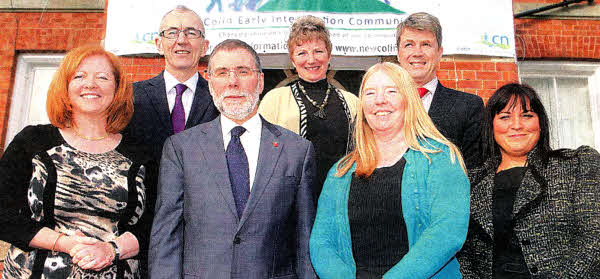Colin community secures £2 million to help local families

Rosemary Stalker, Chair of Colin Neighbourhood Partnership Board, Kieran Drayne, Project Manager at Colin Neighbourhood Partnership, Nelson McCausland, Minister for Social Development, Dr. Suzanne Zeedyk, Honorary Senior Lecturer in the School of Psychology at the University of Dundee, Annle Armstrong, Manager of Colin Neighbourhood Partnership, Hugh McCaughey, Chief Executive of the South Eastern Health and Social Care Trust and Claire Robinson, Principal of St Luke's Primary School pictured at the Colin Neighbourhood Partnership Early Intervention Launch. US4311-130A0
COLIN Early Intervention Community has secured nearly £2 million to deliver early interventions to children, young people and parents, with nearly half of the funding being provided by Atlantic Philanthropies.
The balance is being provided by a range of organizations, including South Eastern Health and Social Care Trust, Health and Social Care Board, Public Health Agency, Department for Social Development, Department for Justice, Glenwood Business Centre and Colin Neighbourhood Partnership.
The Colin Early Intervention Community, focusing on the Twinbrook, Poleglass, Kilwee and Lagmore areas, is a collaboration of the Community Voluntary, Business and Statutory sectors. Led by the Colin Neighbourhood Partnership it will deliver early intervention projects to improve services for children and families in their community.
Early Intervention includes services and programmes which would support attachment and the early years. It will also focus on baby brain development, provide Family Support and help young people make the transition to adulthood.
An example of early intervention is the Parents Support Project, which will provide information to parents on parenting, how babies' brain develop, and how to nurture a secure attachment between mother/father and baby. This will ensure that parents receive help to give their babies the best possible start in life - early intervention.
Speaking of preparations for the Colin Early Intervention Community, Annie Armstrong, Manager of Cohn Neighbourhood Partnership, explained: "Over recent months Colin Early Intervention Community has been meeting with a range of agencies and groups, including FootprintsWomen's Centre, Youth Initiatives, Naiscoil na Fuseioge, SureStart, Footprints, South Eastern Trust, Health and Social Care Board, Public Health Agency, Council for Catholic Maintained Schools, local Schools, Department for Justice, Department for Social Development and Department of Education.
"We have also made presentations directly to Minister Nelson McCausland, (Dept for Social Development, Minister John O'Dowd, (Dept. of Education), Minister David Ford (Dept. of Justice) and Minister Edwin Poots (Department of Health, Social Services and Public Safety).
"To date the response has been overwhelmingly positive. Everyone has recognised that there must be investment, it must be coordinated and it needs to be targeted at early interventions. The Colin Early Intervention Community will lead the development of early intervention to make a major and long lasting impact on the lives of children and young people in the Colin area. Finally, we are delighted that our launch coincides with Colín Parents week where we have a full week of events for children and families." Minister Nelson McCausland, MLA, welcomed and praised the initiative whilst announcing Neighbourhood Renewal funding of £222,000 to support the Colin Early Intervention Community. He said: "The first three years of a child's development provide the foundation for the rest of her or his life. The mid-term review of the Neighbourhood Renewal programme has shown that programmes such as this can make life changing differences to individuals and so are worthy of our support."
Health Minister Edwin Poots added: "There is no doubt that positive early years' experiences give children the best start in life. Research clearly shows that a large part of the pattern of a person's future adult life is set at this stage. It is also clear that disadvantage starts before birth, so action to reduce health inequalities must start before birth and continue through childhood if we are to stand any chance of breaking the close links between early disadvantage and poor outcomes throughout life. Giving every child the best possible start through positive early experiences is crucial to reducing health inequalities. Therefore this investment in proven early years interventions will secure improved outcomes, not just for children and families, but for communities and for society as a whole," he concluded.
julleann.spence@ulsterstar.co.uk
Ulster Star
28/10/2011

